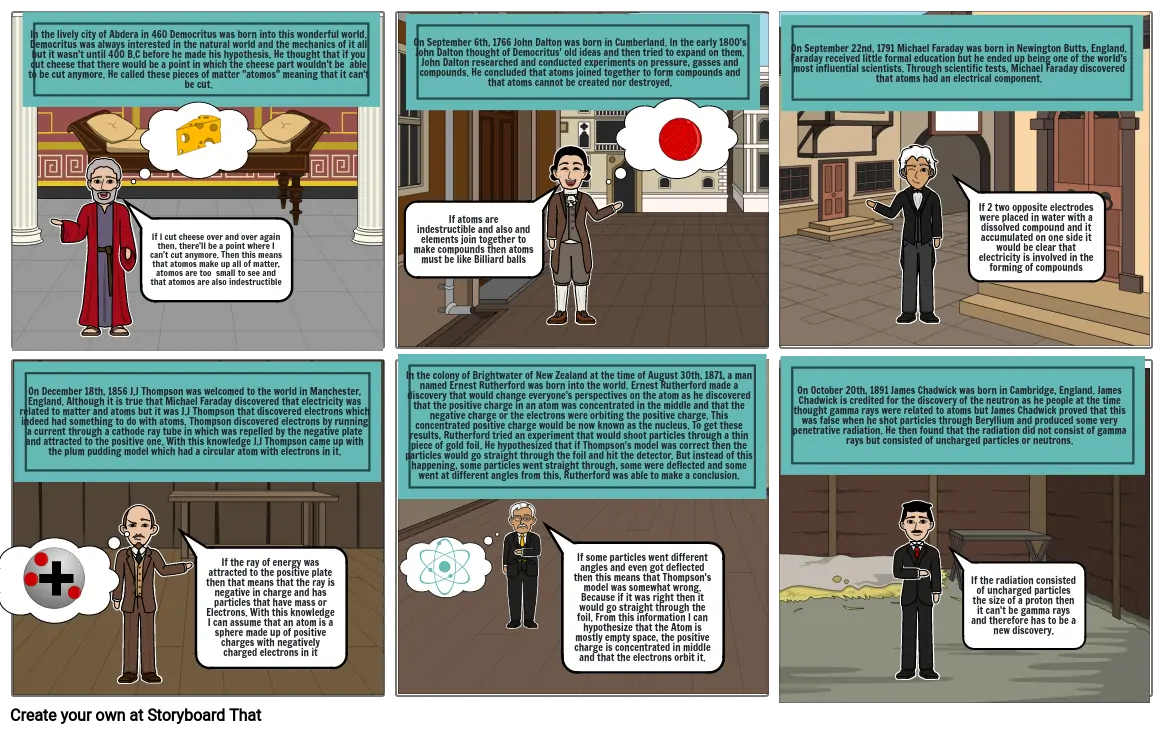Science comic strip on atomic theory

Montāžas Teksta
- In the lively city of Abdera in 460 Democritus was born into this wonderful world. Democritus was always interested in the natural world and the mechanics of it all but it wasn't until 400 B.C before he made his hypothesis. He thought that if you cut cheese that there would be a point in which the cheese part wouldn't be able to be cut anymore. He called these pieces of matter "atomos" meaning that it can't be cut.
- If I cut cheese over and over again then, there'll be a point where I can't cut anymore. Then this means that atomos make up all of matter, atomos are too small to see and that atomos are also indestructible
-
- If atoms are indestructible and also and elements join together to make compounds then atoms must be like Billiard balls
- On September 6th, 1766 John Dalton was born in Cumberland. In the early 1800's John Dalton thought of Democritus' old ideas and then tried to expand on them. John Dalton researched and conducted experiments on pressure, gasses and compounds. He concluded that atoms joined together to form compounds and that atoms cannot be created nor destroyed.
-
- On September 22nd, 1791 Michael Faraday was born in Newington Butts, England. Faraday received little formal education but he ended up being one of the world's most influential scientists. Through scientific tests, Michael Faraday discovered that atoms had an electrical component.
- If 2 two opposite electrodes were placed in water with a dissolved compound and it accumulated on one side it would be clear that electricity is involved in the forming of compounds
-
- On December 18th, 1856 J.J Thompson was welcomed to the world in Manchester, England. Although it is true that Michael Faraday discovered that electricity was related to matter and atoms but it was J.J Thompson that discovered electrons which indeed had something to do with atoms. Thompson discovered electrons by running a current through a cathode ray tube in which was repelled by the negative plate and attracted to the positive one. With this knowledge J.J Thompson came up with the plum pudding model which had a circular atom with electrons in it.
- If the ray of energy was attracted to the positive plate then that means that the ray is negative in charge and has particles that have mass or Electrons. With this knowledge I can assume that an atom is a sphere made up of positive charges with negatively charged electrons in it
- In the colony of Brightwater of New Zealand at the time of August 30th, 1871, a man named Ernest Rutherford was born into the world. Ernest Rutherford made a discovery that would change everyone's perspectives on the atom as he discovered that the positive charge in an atom was concentrated in the middle and that the negative charge or the electrons were orbiting the positive charge. This concentrated positive charge would be now known as the nucleus. To get these results, Rutherford tried an experiment that would shoot particles through a thin piece of gold foil. He hypothesized that if Thompson's model was correct then the particles would go straight through the foil and hit the detector. But instead of this happening, some particles went straight through, some were deflected and some went at different angles from this, Rutherford was able to make a conclusion.
-
- If some particles went different angles and even got deflected then this means that Thompson's model was somewhat wrong. Because if it was right then it would go straight through the foil. From this information I can hypothesize that the Atom is mostly empty space, the positive charge is concentrated in middle and that the electrons orbit it.
- On October 20th, 1891 James Chadwick was born in Cambridge, England. James Chadwick is credited for the discovery of the neutron as he people at the time thought gamma rays were related to atoms but James Chadwick proved that this was false when he shot particles through Beryllium and produced some very penetrative radiation. He then found that the radiation did not consist of gamma rays but consisted of uncharged particles or neutrons.
- If the radiation consisted of uncharged particles the size of a proton then it can't be gamma rays and therefore has to be a new discovery.
Izveidoti vairāk nekā 30 miljoni stāstu shēmu

